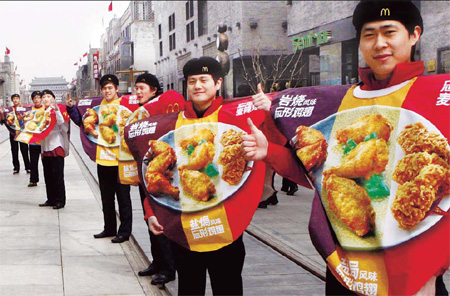Money
The deadly danger of 'seckill'
By Shen Jingting (China Daily)
Updated: 2010-04-23 07:45
 |
Large Medium Small |
|
A fast food restaurant launches its promotion in Qianmen. Businesses were urged to be creative in their marketing by the city government.[ Qian Xingqiang / for China Daily] |
Malls and supermarkets are being strongly urged to stop organizing so-called seckill sales over fears that people could become seriously hurt in the melee they sometimes cause.
Seckill sales get their name from a word that originated in the online gaming community and are characterized by offering products at very cheap prices for exceptionally short periods.
Beijing authorities brought out regulations two years ago to stem their use and strengthened those rules this week, making such sales illegal for "necessities of life" such as rice, oil, meat and eggs.
Xu Kang, deputy director of the Beijing municipal commission of commerce, said using the seckill method to sell necessities of life is now outlawed in Beijing and stores that break the rule face a 100,000-yuan fine.
"We strongly oppose promotions that lead to large numbers of people gathering in a very short time because of the safety problems that could arise," Xu said on Thursday.
Xu pointed out a seckill sale in 2007 at a Carrefour supermarket in southwestern Chongqing municipality caused a stampede that left three dead and injured 31.
Wang Chengrong, vice-president of Beijing Vocational College of Finance and Commerce, said seckill sales are also an infringement of consumers' rights.
"Unlike a common sale, which is open to every client, seckill sales are time-limited and only a small number of clients may get access to the opportunity and that is not fair," Wang said.
Wang said items offered for sale through the seckill method are often sold for less than their cost price as stores compete with one another to attract customers.
Li Shunli, chairman of the Beijing Chamber of Commerce, suggested retailers consider more creative and effective means of promoting themselves.
"Price cuts are not the only or most important way of doing promotions," Li said.
"Shopping malls and supermarkets can introduce new products, such as energy-saving items, to ignite people's interest and explore market potential."
What's more, the addition of a cultural element to promotions can help, as can improvements to customer service and experimental marketing ideas.
Guiyou department store, for example, has worked with communications organizations on promotions and held events such as a session for VIP clients that featured the Deyun cross-talk group and actor Deng Chao.
Liu Yaling, general manager of Yansha Youyi Shopping City, told METRO they too try to find other ways to bring in customers.
"We rarely hold sales, maybe twice a year for member card holders, but we have worked with a physical examination center, a music hall and a travel agency to help maintain a good relationship with customers," Liu said.
During the first quarter, spending by customers with membership cards at the store accounted for 70 percent of total revenue, which was up 56 percent on the same period last year.
The strengthening of the regulations follows the introduction of rules governing promotional sales that came out on April 28, 2008.
The original regulation pertained to around 1,000 retail outlets in the capital and mandated safety measures necessary for promotions likely to attract large numbers of people.
But two years later, rule violations are still happening. MerryMart, a Beijing supermarket owned by the Wumart Group, reportedly tried to hold a seckill sale for goods including rice, oil and eggs on Tuesday and was prevented from doing so by the Beijing municipal commission of commerce.








